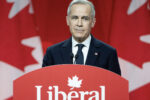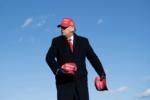Trump’s Tariffs on Key Trading Partners Spark Economic Concerns and Political Tensions

President Donald Trump has pushed forward with sweeping tariffs aimed at three of the United States’ largest trading partners Mexico, Canada, and China triggering concerns about potential economic fallout and political tension. While the president argues these tariffs are necessary to protect U.S. industries and curb issues like immigration and drug trafficking, critics warn of broader negative effects on global markets, domestic industries, and American consumers.
Short-Term Pain for Long-Term Gain?
In a recent statement, Trump acknowledged that the new tariffs, which include a 25% levy on goods from Canada and Mexico and a 10% tariff on Chinese imports, could cause “short term pain” for Americans. However, he argued the tariffs are necessary for the long-term benefit of the U.S. economy, claiming that the United States has been “ripped off” by other countries for decades.
“We may have some short term pain, and people understand that,” Trump said. “But long term, the United States has been ripped off by virtually every country in the world.”
Despite Trump’s claims, economists are concerned that the tariffs could slow global economic growth, raise consumer prices, and lead to higher inflation. U.S. stock futures saw a sharp drop of more than 2% in early trading, with markets across Asia also taking a hit. The Chinese yuan, Mexican peso, and Canadian dollar all weakened against the U.S. dollar. The ripple effects were felt in energy markets as well, with crude oil prices rising by over $1 a barrel, partly due to the tariffs’ impact on U.S. imports from Canada and Mexico, both of which are major suppliers of crude.
Political Pushback and Retaliatory Measures
In response to Trump’s move, both Canada and Mexico have announced retaliatory tariffs on U.S. goods. Mexico has vowed resilience, with President Claudia Sheinbaum condemning the U.S. stance on fentanyl and arguing that tariffs will not solve the issue. Canada, led by Prime Minister Justin Trudeau, has promised to challenge the tariffs through international legal channels and impose duties on $155 billion worth of U.S. exports, including goods like peanut butter, wine, and lumber.
Trump has downplayed the significance of these retaliatory measures, stating that “they owe us a lot of money” and hinting that these countries would eventually “pay” what they owe the U.S. However, both Canada and Mexico have made it clear they will not back down. Trudeau even encouraged Canadians to boycott U.S. goods in protest of the tariffs.
Economic Impact and the Threat of Stagflation
The tariffs, which will cover nearly half of all U.S. imports, are expected to strain supply chains and increase costs for consumers. ING analysts have noted that the U.S. would need to more than double its manufacturing output to replace imports, a task deemed impossible in the short term. This could potentially lead to higher prices for everyday goods, from cars to electronics, which are heavily reliant on international supply chains.
For Canada and Mexico, the tariffs could lead to economic slowdowns, with some economists predicting a potential recession in both countries. In the U.S., there are concerns about the possibility of “stagflation”—a troubling combination of high inflation, slow economic growth, and high unemployment. Analysts have warned that the tariffs, in the long run, could hurt all countries involved.
The Path Ahead
The tariffs are set to take effect early Tuesday, with President Trump invoking emergency powers under the International Emergency Economic Powers Act and the National Emergencies Act. This move has sparked significant legal and political debate. Trade lawyers warn that Trump’s use of emergency powers could face legal challenges, and some Republicans have expressed concern about the negative consequences for American consumers.
Senate Majority Leader Mitch McConnell has criticized the tariffs, noting that they would ultimately be paid for by American consumers. “Why would you want to get in a fight with your allies over this?” McConnell asked in a recent interview.
Public opinion on the tariffs is divided. A Reuters/Ipsos poll found that 54% of Americans oppose the new tariffs, while 43% support them. Democrats tend to be more critical of the measures, while Republicans are generally in favor of the president’s aggressive trade stance.
Global Repercussions and Future Negotiations
Trump’s tariffs are just the beginning, with the president warning that additional tariffs on European Union goods are also in the works. In response, the EU has vowed to retaliate if tariffs are imposed on European products, with companies like Volkswagen expressing hope that talks could prevent a full-blown trade conflict.
For North American automakers, the tariffs could have serious consequences, particularly as many vehicles produced in Canada and Mexico rely on parts and materials from other countries in the region. The imposition of tariffs would increase costs for car manufacturers and could lead to higher prices for consumers.
Meanwhile, Chinese officials have said they plan to challenge the tariffs at the World Trade Organization, though they have also indicated a willingness to negotiate. The Chinese government has specifically pushed back against the U.S. assertion that fentanyl, a deadly opioid, is a national security threat. “Fentanyl is America’s problem,” China’s foreign ministry said, arguing that China has already taken extensive steps to combat the issue.
Conclusion
As President Trump’s tariffs take effect, the global trade landscape faces significant uncertainty. While Trump insists that the long-term benefits will outweigh the short-term pain, the economic fallout remains to be seen. With rising tensions between the U.S., Canada, Mexico, China, and the European Union, the potential for a broader trade war looms large, and businesses and consumers alike are bracing for what’s to come. As the situation develops, both the U.S. economy and the global market will be watching closely to see if negotiations can ease the growing tensions or if the tariff conflict will escalate into a full-scale trade war.







